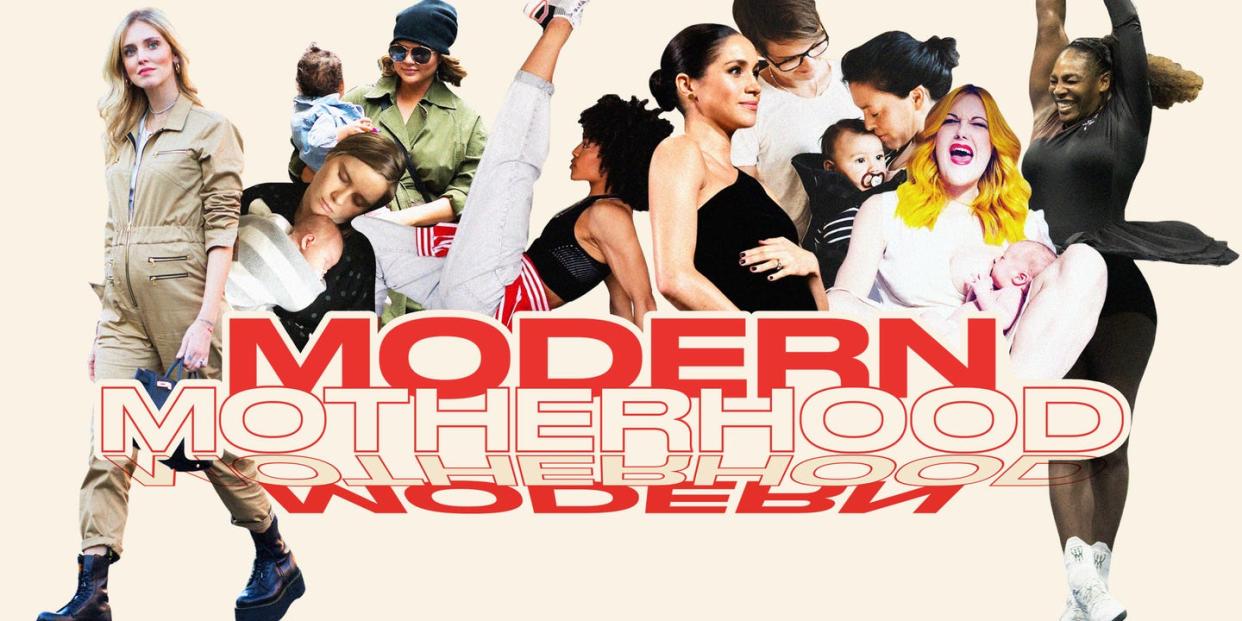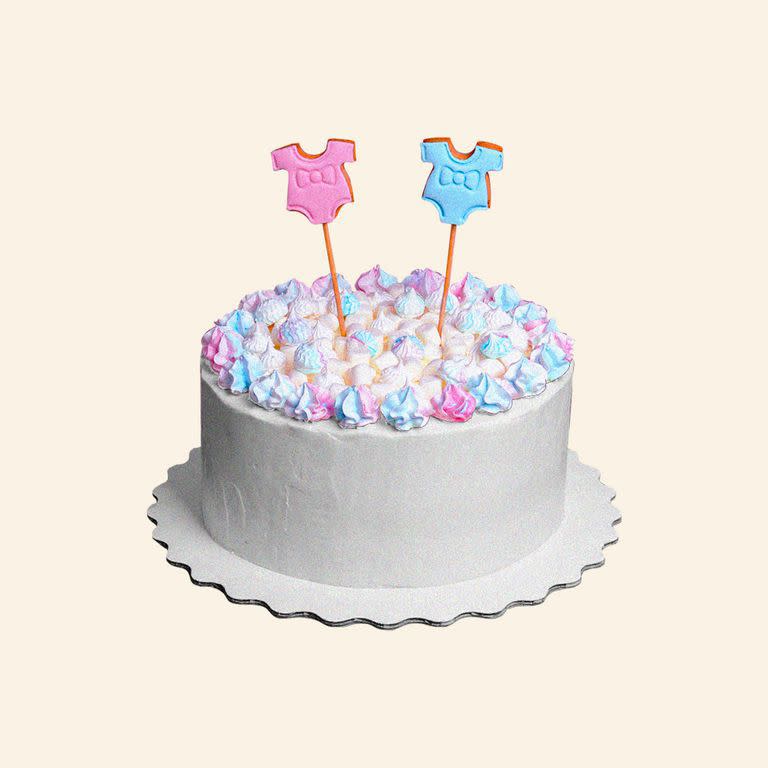The Modern Motherhood Series

What does motherhood look like, in 2019?
Certainly, it’s no longer contingent on the act of birthing a child. In a same sex partnership between two women, for example, the advent of parenthood naturally begets two mothers, irrespective of whose body grew the baby. But a single dad is also, in some ways, a mother, in that he has to wear all the hats that nurturing a child requires.
Can you participate in motherhood without being yourself a parent? Many feel that they have performed some facet of mothering to another person’s children.
And what about how you perform that mothering? Motherhood is arguably no longer based on the tenets of feed, clean, soothe and repeat. It’s a whole host of alternating and varied qualities that exist in many different guises and combinations. Mothering can be done an infinite number of ways, which makes it seem bizarre that anyone should ever offer any unsolicited advice for it, or that there are still any enduring traditions associated with it.
The Modern Motherhood Series on ELLE explores the idea of motherhood in 2019. Here we look at what motherhood means, how we approach it politically, culturally and the changing role of ‘mother’ in society. We’ll address under-talked about topics, draw attention to the huge variety of different options and support systems available to people and give a voice to as many different mothers as we possibly can.
Here’s what we’ve covered so far…
My Pregnant Body - How the Very Fit Cope With Changing Shape
Equal parts delightful, daunting and, at times, derailing, pregnancy, and the myriad changes to your body that come with it, can be overwhelming enough for, as Mean Girls put it, 'regular mums'.
But what happens when an ever expanding belly affects more than just your ability to wear that new pair of Levi’s Ribcage jeans? What about when it takes control of your career, health and sense of self? Oh, and you've got hundreds of thousands of Instagram followers scrutinising every stretch mark and sumo squat, while you're at it. For three fitness influencers, that was the reality. From unplanned c-sections and post-baby body pressure, to surprise cellulite and working out until you're literally in labour, this is what really happens to your body when you're an exercise queen and also a mother-to-be.
'I normally work out for five hours a day so the thought of not doing any exercise didn’t even cross my mind,' says Simone De La Rue aka Body By Simone. But even professionals have to take a time out when nature has other ideas, ‘I got pregnant via IVF so I spent the whole first trimester in a constant state of anxiety and exercise took a backseat,’ says journalist and personal trainer Gemma Yates. ‘As someone who worked out 5-7 times a week prior to getting pregnant, not moving was tough both physically and mentally.’ But being a new mum doesn't mean sacrificing exercise altogether, more a change of pace. 'I can no longer do a press up unless it’s on my knees, leg pressing 130kg is a distant memory and the post-workout DOMS are real. But, I’m a big believer in reframing things – instead of seeing of it as a set back, it’s a chance to start over and retrain my body.'
How To Dress Your Bump: Fashion Insiders Address Maternity Style
In a recent ELLE catch-up a staff member - concerned with sustainability - pondered, ‘what do women do with their old maternity clothes?’ only for our Deputy Editor to retort ‘don’t buy them in the first place!’
Kenya Hunt, who is two children and two impeccably-dressed pregnancies in, explained that she avoids maternity clothing as a concept, opting instead for ‘lots of men’s button-down shirts that I could still pull out post-baby (I wore them with my husband’s jeans) and a stretchy, body-con mini dress and my Balenciaga leather Moto jacket.’
In a nutshell, she says: ‘Why buy clothes you’ll only wear for a few months when you can invest in pieces you’ll want to continue to wear afterwards?’
Despite searches for maternity clothing increasing 23 per cent month on month (according to Lyst) and Meghan Markle’s own bump stylings causing crazy spikes in traffic and sell-out items (remember those ASOS and H&M maternity dresses?), we wonder whether, much like Hunt, cool-mums such as Katherine Ormerod and Laura Jackson are going against the grain, eschewing maternity clothes altogether?
Are gender reveal parties really OK?
If you’ve been on Instagram in the last year – and you follow anything beyond teeth-whitening tricks and dogs on skateboards – then you’ll likely know what a ‘gender reveal party’ is. But have you ever questioned whether they're actually ok, ethically?
Some, like mums Bushra Morgan and Amanda Hallpike, see them as harmless fun and even a nice way to discourage people from having a bias towards a particular gender. Others on the other hand, like journalist Kim Easton-Smith and humanist celebrant Ronit Quale see them as palpably damaging for future generations.
‘Gender reveal parties encourage gendered parenting,’ says Quayle.
‘Gendered parenting sets limits on children, especially girls. But patriarchy hurts boys too, and I don't want my son to feel like he has to play football or can't show his feelings,’ she continues.
At a time when we're attempting not to take a binary approach to anything, are gender reveal parties, with all their pink and blue accoutrements, actually quite reductive?

Treating Tokophobia: The Women Who Are Terrified Of Giving Birth
‘I think I always knew that I would die during childbirth,’ says Sophie, 33-years-old and currently pregnant with twins.
Most people are a little scared of giving birth, but this is a look at the people who are terrified to the point of not wanting to go through it at all.
'I think we do have a problem, when so many women are absolutely dreading [childbirth],' says founder of The Positive Birth Movement, Milli Hill. 'Birth has begun to be accepted as traumatic, or even violating, by its very nature. We are beginning to lose track of the possibility that it can be anything other than dreadful.'
Birth-aversion, a.k.a. 'tokophobia,' appears to be on the rise. In this feature we take a look at the phenomenon and dig deeper into fear in general, to see whether we're broadly failing pregnant women by limiting their agency over their own bodies.

The Post-Birth Shock - Relearning Your Life In the Aftermath Of Having A Baby
Having a baby is tough. Not only are you now responsible for a tiny person, you’re likely adjusting to other changes too, such as lack of sleep, a shift in relationship dynamics or financial pressures.
It’s not surprising, then, that one in five women will experience mental illness during pregnancy and in the immediate aftermath of it. These can include postnatal depression (PND), postnatal anxiety, postnatal obsessive compulsive disorder (OCD) and the rare but severe postpartum psychosis. While you’ve likely heard of the ‘baby blues’, if your mood or symptoms continue for weeks, you may be experiencing something more serious.
Several women spoke openly to us about a range of conditions. They were brave, too, risking judgement from a society that romanticises the relationship between new mothers and their babies.
The Ugly-Cute Reality Of The First Few Months
What is your idea of those first months of motherhood?
Does a nappy or formula advert spring to mind? A serene scene including clean blankets and a giggling, cherubic infant?
Or are you thinking of the plot of the Charlize Theron-Starring film Tully (otherwise known as Hollywood's greatest contraceptive)?
For most people, the reality exists somewhere in-between.
‘From the moment that he was born, I realised “I will never ever just be me ever again”, which is a really difficult feeling. I instantly wanted it to go back to how it was, and I didn't want him here.
‘I didn't feel inundated and overwhelmed with love. I just felt really anxious, really terrified and really scared.’
This is how 26 year-old mother Georgia, described the moments after her son Beau was born.
In-between the extremes of postpartum depression and rare low-stress births, exists the majority of mothers' experiences - a little bit scary, often rewarding, sometimes monstrously gross.
We spoke to six mums who detailed the pee-stained tops, the feelings of something tantamount to regret and moments of rare euphoria, to try and learn what those first months of motherhood are really, truly like.
Parenting Your Way - Meet The Mothers Making Their Own Rules
From nurseries decorated with vegan paint, to rumours of a doula and cancelling the post-birth announcement outside the Lindo Wing, as Meghan Markle continues to buck royal baby traditions we look to eight other mums who are forging a new narrative of motherhood.
Whether it’s starting an Instagram account dedicated to your newborn, a la author and influencer Katherine Ormerod, sending your daughter to mindfulness school so she can ‘connect within herself when she needs to take time out to meditate', or leaving your baby at home while you take a child-free holiday with your husband, these are the women re-writing the 'rulebook' to parent their way.
Or as Communications Manager and anti-sterilisation mum, Vanessa Emery, puts it, ‘For me, the rules are important and a good foundation. Taking them at face value helped, but researching and understanding them allowed me to find a bespoke approach for me and my baby that achieved the same results.'
Birth Strikers: Meet The Women Refusing To Have Children Because Of Climate Change
Climate change can often still feel like a fuzzy, far-off concept. But the sticky-hot Februaries, Californian wildfires and Biblical flooding are all indicators that the effects are not only on their way – they’re already here.
With that in mind, a growing number of women are refusing to have children in response to the world’s looming environmental crisis. We meet 33-year-old Blythe Pepino, who set up Birth Strike – an activist group centred whose members have made the (often painful) decision to abstain from procreation. Many are in long term relationships; many want kids.
For fellow member Jen Witts, her maternal instinct kicked in around the same time she fully acknowledged the ‘emergency’ we’re in. In the end, however, it didn’t even feel like a choice. ‘How could I give birth when we have such an uncertain and terrifying future?'
('You Might Also Like',)

